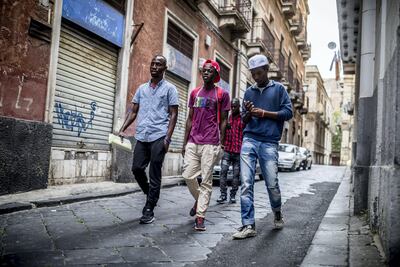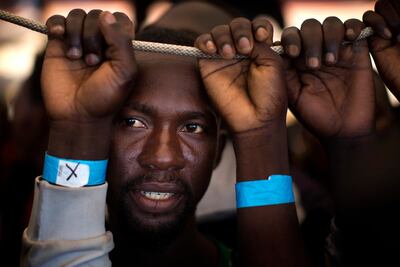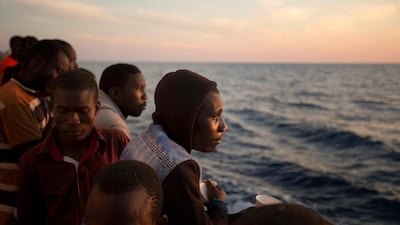On a fiercely hot summer’s day in the Sicilian port of Catania, a group of recently-arrived migrants are lying under palm trees beside the central train station. The seven men, ranging in age from 16 to 25, have travelled from as far afield as Bangladesh, Nigeria and the Gambia. Now they are watching the world go by.
Having made it to the European Union (EU), there’s no great rush yet to push on. Their applications for asylum are stuck in an overloaded system, and while some of them are finding work where they can, for now they wait, many being fed and housed in hostels run by private organisations and charities.
One of the Bangladeshi men, Akash (not his real name), 25, explains how he ended up in Sicily. He had worked as a cleaner in Libya since 2013, joining tens of thousands of his compatriots in the troubled state. “I paid an agency in Dhaka, and they found me the job in Libya, in a hospital in Tripoli. The work was very hard and the country was very unsafe,” he says.
Millions of Bangladeshis work overseas, sending money back to their families. Like many of them, Akash was misled about the job. He was paid far less than he was promised and was treated with little dignity. The security situation in Libya deteriorated, as ISIL-affiliated militias waged a terror campaign, and Akash decided to flee to Europe in early 2017.
“We found a gang of people smugglers who said they would take us to Italy. I wanted to travel on to Germany. I handed over 1,500 euros to a member of the gang, then the next night we were told to go to the waterfront. There was a large inflatable boat [with an outboard motor] there which didn’t look very safe and there were 200 of us waiting to get on board. Before we did so, the gang robbed us of all our belongings.”
After they left the Libya under cover of darkness, Akash noticed the packed boat was sitting very low in the water. As dawn broke, the vessel was no longer moving in the sea, and the passengers began to fear that they would die. “There weren’t enough life jackets for everyone, and people began to panic,” he says.
They were picked up by a rescue boat run by a non-governmental organisation (NGO). “They sent out a small boat to where we were, and then took us onto a bigger ship, where they gave us food and water. We were so happy to have been saved.”
Upon arrival in Sicily, Akash and the others from his boat were processed through a centre where they were registered by the Italian government and where he applied for asylum. He was then sent to a charity-run shelter for young migrants like himself. His friends on the lawn also stay there. it is close to the station, which is why young migrants like Akash congregate there.

The front line in the migrant crisis used to be the eastern flank of Europe, which saw the mass movement of refugees into the continent through Turkey and Greece. The death of toddler Aylan Kurdi in 2015, his body washed up on a Turkish beach, forced the world's gaze to the unfolding tragedy. But an agreement between Turkey and the European Union in March 2016 shifted the main migrant route to North Africa and Italy. Sicily is now Europe's front line.
The island has long been a place of tolerance towards immigrants, having spent hundreds of years being invaded and settled by everyone from the Romans to the Normans to the Byzantines. Many in Catania see the latest influx as just the latest manifestation of this historical trend and despite some misgivings, Sicilians have proved more welcoming than mainlanders from the rich north of the country, who are increasingly shrill in their demands to put up the ‘full’ sign on the country.
Earlier this year, Catania’s mayor, Enzo Bianco, said: “[This city], in these years, has received thousands of desperate people fleeing war and hunger, people saved from death by European ships in the Mediterranean who often have lost one or more loved ones crossing the sea. To talk of the ‘defence of Europe’ is demagogic and self-serving.”
His words were in response to attempts by a far-right group to launch a ship from the island to counter migrant boats.
More than 100,000 people entered the EU from the south during 2016, the vast majority of them coming from Libya. This development led to NGOs stationing rescue boats in southern Italian islands. There are also boats operating out of Malta, although the small island state has taken in no refugees for the last three years.
It is in the ports of Sicily where many of the NGOs are operating. In early August in Catania, there was a boat moored up every few hundred metres, in the shadow of a hulking Italian naval ship.
In late July, the Italian government issued a code of conduct for NGOs operating boats in the Mediterranean, including measures to stop the vessels sending signals alerting the migrant boats to their position and banning the NGOs from crossing into Libyan territorial waters. The aim was to reduce the ‘pull’ which the Italians claimed the NGO boats exert when they go out. Some charities, including Doctors Without Borders, also known as Medecins Sans Frontieres (MSF), were even accused of running a ‘taxi service’ for migrants and making life easier for the people smugglers, encouraging them to head out to sea in boats that were even less seaworthy, safe in the knowledge that they were more likely to be intercepted by rescue boats closer to the Libyan coast. For the migrants, this made the crossing even more perilous, of course.
Save the Children signed the charter, saying they were already complying with the 12 points it contained. MSF and four other NGOs refused. A statement from MSF said: “[The] proposals — in particular the one stating that vessels engaged in rescue must disembark survivors to a place of safety as a rule instead of transferring to other ships — present unnecessary limitations to the means at our disposal today. A reduction in the number of rescue vessels would weaken an already insufficient search and rescue capacity, resulting in an increase in mass drownings.”
_______________________
For more:
Two years on, Aylan Kurdi’s death has changed little for Syrian children
Migrants arrested in Italy for people-smuggling may be victims
Leaders urge migrant screening in Africa to stem Med crossings
_______________________
It became increasingly obvious in August that the rules of engagement for the NGOs operating in the Mediterranean were changing. Early in the month, Iuventa, a ship chartered by the radical German NGO, Jugend Rettet (‘Youth rescues’), was stopped by the Italian coastguard off the Italian island of Lampedusa. A prosecutor subsequently alleged that the crew had been involved in “the crime of clandestine immigration” and that there had been “contacts, meetings [and] understandings” between them and the smugglers.
It later emerged that some of Italian government’s evidence on the Iuventa's activities had been gathered by an undercover agent who was on board the Vos Hestia, Save the Children’s boat operating out of Sicily.
The Italians recorded a 50 per cent drop in the number of migrants in July from the previous year and it became clear there would be an even more substantial drop in August. According to Frontex, the EU’s border control agency, this sharp fall had already begun earlier in the summer, due to inclement sailing conditions in the Mediterranean and more patrols by the Libyan coastguard, who have received equipment and training from the Italians. However, the code of conduct clearly had a major impact in August.
However, few believe the reduction truly means fewer migrants are attempting the crossing. Rather, they have simply moved on to another destination — namely, Spain, where 600 migrants arrived on a single day, August 16, much to the surprise of holidaymakers on the beach at the time.

Meanwhile, along the Via IV Aprile that runs along Catania’s waterfront from the docks to the central station, the mood is one of patient indifference. Few among the migrant population expect anything to happen any time soon. Their dreams of onward travel through Europe remain on hold and they are trying to make the most of their lives in Sicily.
The industry and entrepreneurial spirit of the migrant population is evident all over town. Amid the stalls laden with fresh Sicilian produce at La Fiera, the huge covered market that spreads across the Piazza Carla Alberta in the centre of Catania, you will find them wheeling makeshift trolleys loaded with knock-off designer sunglasses, sun hats and football shirts of questionable provenance.
At road junctions, there are Bangladeshis respectfully offering to clean car windows as drivers idle at red lights. In the squares round the city's majestic baroque cathedral, hawkers peddle bottles of water and tourist geegaws bearing the omnipresent elephant symbol of Catania.
It’s a city which for more than two and a half millennia, since it was first settled by the Greeks, has demonstrated a proud tradition of openness towards the world. Whether that extends beyond the sun-kissed coast of Sicily to the mainland — and to the wider borders of Europe beyond — is not so evident.

